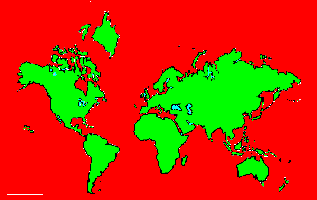SPECIES INFO
Note the two long tentacles that can grab food and bring the food to the mouth.The Beroe genus contains about 20 species. These have been called the "Cigar Comb Jellies". They are only found in marine environments. The cilia are arranged in 8 plates along the longitudinal axis, and the movement of these cilia creates a swimming movement.
The Beroidae family has two genera. The Beroe genus has about 20 species. The Neis genus has only one species.
The Nuda Class has only one order.
Bryozoans (Ectoprocta) are typically marine species attached to hard surfaces that use tentacles mounted above to move tiny organisms into their digestive system. There are perhaps 5,000 known marine species and about 50 freshwater kinds. They are tiny filter feeders.
The ribbon worms (Nemertea) are a group of mostly marine animals that have a mouth and anus. Most species are rarely seen.
The Comb Jellies (Phylum Ctenopora) are an unusual group of animals that are usually found in deeper marine waters. Although some can be up to 6 inches in length, several are much smaller. These very fragile animals are carnivorous. They capture food with two tentacles which move food to the mouth. Some species are nearly transparent while others are luminescent. They can be identified by the 8 rows of comb like plates on each side of the body.
Animal Kingdom contains numerous organisms that feed on other animals or plants. Included in the animal kingdom are the lower marine invertebrates such as sponges and corals, the jointed legged animals such as insects and spiders, and the backboned animals such as fish, amphibians, reptiles, birds, and mammals.


